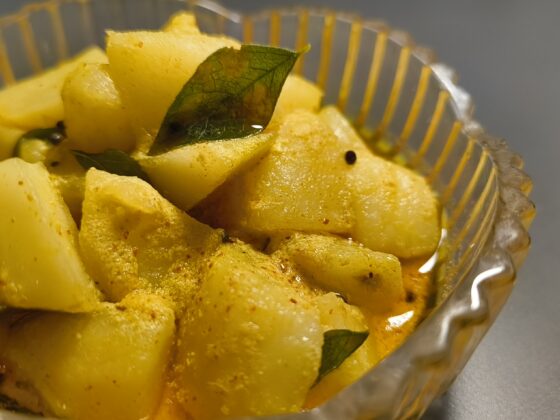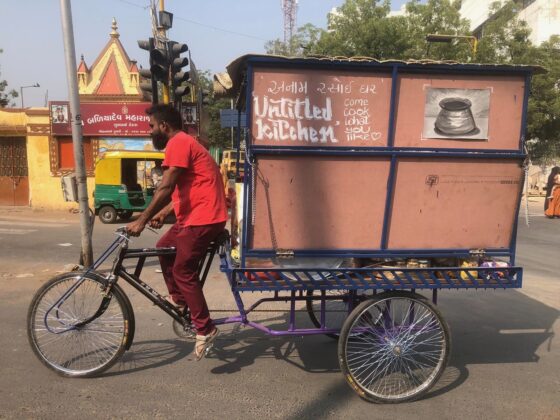If you look at what’s on our plate today, you’ll see that we have grown to rely on a handful of staples that we keep returning to. But if you go back even a 100 years, you’ll see that the diets of our ancestors were far more diverse. While over the course of time, humans have consumed thousands of varieties of flora and fauna, at present, the diversity of what we eat has dwindled.
What we’ve lost along the way is not just an abundance of flavours and textures, but also the knowledge of seasonality, and where our food comes from. In present day India, much of this knowledge rests with our adivasi communities, many of whom still rely on wild food produce for their sustenance. And while they are the long-serving custodians of wild foods, and play a vital role in conserving our biodiversity, this is most often overlooked.
The Wild Food Project is our modest attempt to study, archive, and celebrate indigenous forest produce, and the vast traditional knowledge that surrounds it. In 2022, we made a start in Palghar district in Maharashtra during the monsoons.

At the core of our project are people from the Kokni tribe in Maharashtra’s Palghar district, whose culinary wisdom we have built upon.
The Purpose
Rooted in Maharashtra’s Palghar district, The Wild Food Project’s Monsoon Edition (June-August 2022) was designed to:
- Learn about indigenous forest produce specific to the monsoons, and document this knowledge.
- Work closely with indigenous communities in the region, and recognise their role in offering us their traditional knowledge gathered over decades.
- Raise awareness about uncultivated foods found in forests, and its crucial role in our culinary heritage.
- Bring together people from across fields to celebrate wild foods, and find imaginative ways to archive this knowledge for future generations.


Working With Palghar’s Wild Foods: A Timeline
The Wild Food Project began in June 2022, and ended in August 2022 with a Wild Food Festival organised by OOO Farms, and a wonderful zine that we’re proud of. In case you are one for details, we’ve got you covered.

A Wild Food Walk in Mumbai
To learn about wild foods growing within city limits, we organised a walk inside the lush Sanjay Gandhi National Park along with Shailesh Awate (co-founder of OOO Farms).

Celebrating Diverse Wild Foods

Raising awareness of the variety of wild foods found in Maharashtra, the Wild Food Festival included talks by experts such as Debal Deb, Shikha Kansagara, and Kurush Dalal, and gave guests an opportunity to taste over 40 wild vegetables. They also enjoyed a lunch prepared by the members of the Kokni community from Palghar, which included 32 wild food items. The festival was attended by over 400 people.
A labour of love, this zine captures the efforts of a multidisciplinary team to document and preserve knowledge of Maharashtra’s wild foods, harvested in the monsoons. It features 24 different wild ingredients with information about their seasonality, how to identify them, how they are traditionally cooked, along with interesting recipes using these. At present, we’re working on a Marathi translation of the zine.
The Impact
Rooted in Maharashtra’s Palghar district, The Wild Food Project’s Monsoon Edition (June-August 2022) was designed to:
- Researched over 35 wild foods, including tera, cha deth, kharshinga, and fatangadi.
- Archived 24 wild foods via the wild food zine.
- Documented two recipes—Kantola Bhaji and Mahuja Flower Bhaji—of the Kokni community, and created three new contemporary recipes inspired by the ingredients and their traditional ways of cooking.
- Rekindling of pride about their foodways within the Kokni tribe in Palghar.
- An increased awareness around the nutritional value of wild foods, along with the role they have played in offering sustenance to indigenous communities.
- Working on The Wild Food Project opened new doors for us—since then, our team has been invited to participate and contribute to other projects across the country that are committed to spotlighting the diversity of wild foods in India.
The Challenges
Like any project that aims to archive culinary traditions from the past, we had to work through our own set of challenges.
- At present, knowledge of forest foods is fragmented even within the community. With transfer of knowledge having mostly been oral, it was often difficult to pin down accurate information.
- With the passing of time, ways of cooking have changed as well. For instance, the use of certain ingredients, and even utensils.
- Trust is vital when it comes to working with indigenous communities. Fortunately, we had OOO Farms to guide us, and facilitate interactions with sensitivity.

Who
We are a bunch of people with varied skills—writers and researchers to chefs and photographers—with a shared (and deep) interest in learning more about diverse foodways.



Wild Food Project Contributors
Research | Aditi Prabhu is a nutritionist who aims to make people build positive food relationships by making nutrition accessible to all.
Recipe Testing | Akshay Purohit is a creative chef who likes to drive cuisine towards the avant-garde without shedding the reins of familiarity and history.
Research | Amar Gutta has a keen interest in food anthropology and aims to research and document aspects of food in India from historical times to the present.
Research | Shreshtha Chhabra is a researcher with an inclination towards the food-art-community nexus. She aims to learn about food from the intricate perspectives of policy, societal impact, and collective sustenance.
Recipe Testing | Chaitali Pednekar aims to understand sustainable ways to grow diverse indigenous food, cook it and serve it to people in a more conscientious way.
Recipe Testing | Gresham Fernandes, Culinary Director at Impresario Entertainment & Hospitality Pvt. Ltd. has been cooking for 22 years and is always inquisitive.
Illustrator | Jaya is an illustrator and designer based in Mumbai who likes drawing people, food, and mundane everyday things.
Recipe Testing | Jyoti Vishnani left her corporate career behind to pursue a career in the culinary industry and works with renowned chefs across the country.
Photography | Natasha Bandlish is a Mumbai-based English teacher, photographer and visual storyteller who is passionate about capturing people, food and all the spaces wherein the two intersect.
Recipe Testing | Rajesh Moolchandani is a research and development chef with Zion Hospitality mentoring 19 restaurants with his menus across 30 brands.
Editorial / Art Direction | Rhea Shah is a transdisciplinary environmental designer who believes design should be a cultural manifestation of ecological processes.
Editorial | Rushina Munshaw-Ghildiyal, owner of A Perfect Bite Consulting, is a culinary chronicler and consultant covering food histories and stories around ingredients, cuisines, and the people who cook them.
Convenor | Shailesh Awate, co-founder of OOO Farms, is deeply entwined with the farming communities and wild foods in the Western Ghats and is determined to conserve rural livelihoods and introduce native foods to urban diets.
Convenor | Shikha Kansagara, co-founder of OOO Farms, works toward supporting food security for everyone, learning native farming practices and bringing local varieties of crops to the urban Indian consumer.
Convenor | Takshama Pandit is the Sourcing and Partnerships head at The Locavore. She hopes to continue studying the Indian food system’s complexities and aims to bring together individuals with a shared vision to create an impact.
Convenor | Thomas Zacharias is the chef and founder of The Locavore and is focused on bringing together some of his passions–storytelling, working with local produce, and nurturing connections between people within the Indian food system.
Convenor | Zainab Kapadia leads Marketing and Communications at The Locavore and is passionate about telling stories and shaping transparent narratives.
In the Media
On a journey to find where the wild things grow by Avantika Bhuyan, published in Mint Lounge.
Dinner From a Grove by Nidhi Lodaya, published in Mid-day.




